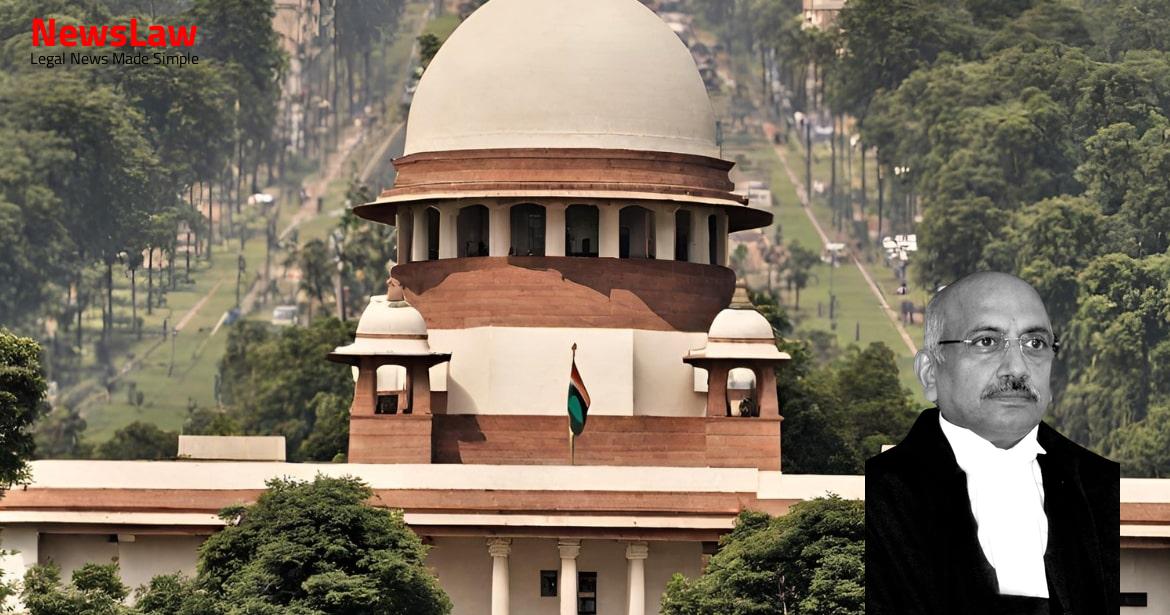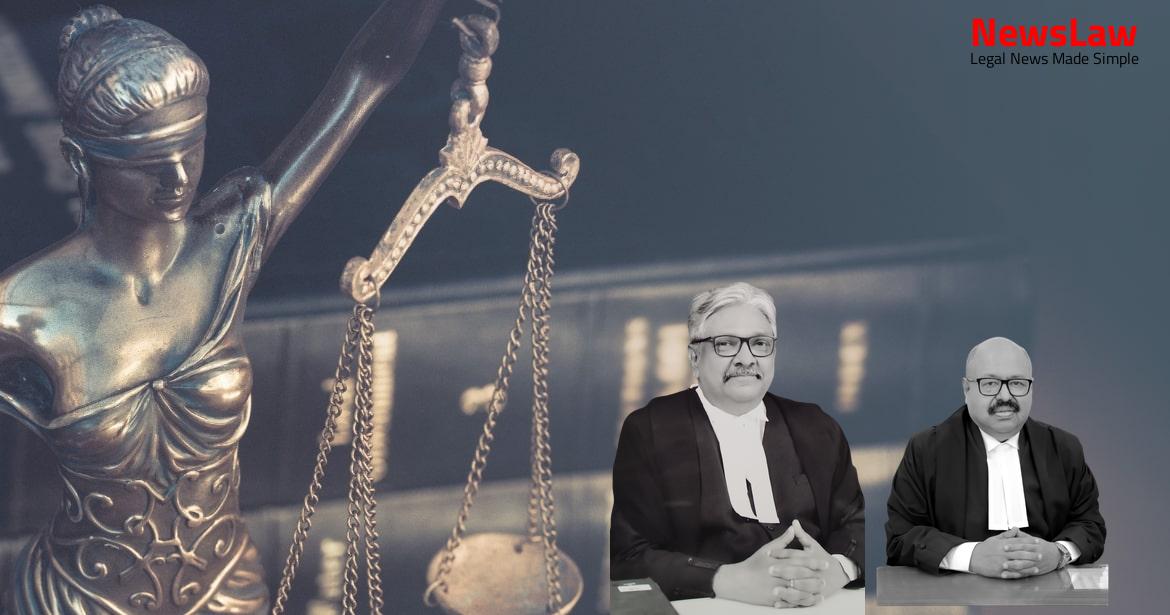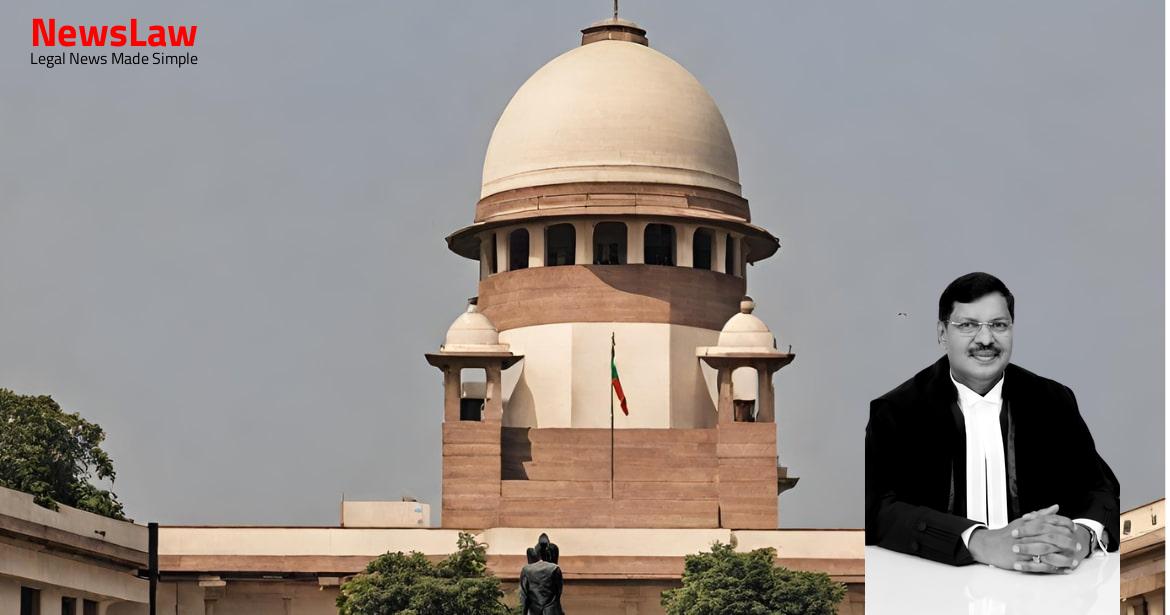Delve into the detailed legal analysis by the court regarding the treatment of SSC officers in the Indian Navy. The examination focuses on policy letters, notifications, and the evolution of practices, emphasizing gender equality and rectification of historical injustices. The court’s thorough review highlights the importance of fair treatment and equal opportunities for all officers. Stay tuned for more on this significant case.
Facts
- The AFT directed the reconsideration of the request for the grant of PCs based on Regulation 203 and a policy decision from February 1999 within six months.
- The applicants were directed to be continued as SSC officers on existing terms and conditions until the reconsideration exercise was completed.
- An interim order was passed by the Court on November 20, 2015, providing protection only to women officers in service on September 26, 2008.
- The AFT concluded that a policy decision from February 1999 for the grant of PCs held the field, and the subsequent decision in September 2008 was made without considering the earlier one.
- The AFT disagreed with the absolute relief granted by the Delhi High Court for the grant of PCs and directed authorities to consider the cases of SSC officers for the same.
- The AFT expressed that it lacks the expertise to decide on granting PCs and left that decision to the relevant authorities.
- The lead Original Application was instituted by Commander Priya Khurana for the benefit of future batches inducted on SSCs after the challenge to the implementation guidelines dated 3 December 2008.
- Lieutenant Commander Annie Nagaraja was the first petitioner in the Writ Petition before the High Court.
- The provisions leading to the 1957 Act were deliberated upon in a report of the Joint Committee of Parliament.
- The applicants before the AFT in this batch of cases were SSC officers in the Logistics, ATC, and Education branches who sought PCs and challenged the policy document dated 26 September 2008.
- Seventeen women officers in the Logistics, ATC, and Education branches of the Indian Navy, despite completing fourteen years of service as SSC officers, were not considered for the grant of Permanent Commissions and were discharged from service.
Also Read: Legal Analysis on Arbitration Petition Limitation Period
Issue
- The court is required to adjudicate upon the validity and effect of the policy letter dated 26 September 2008 in the appeals filed by the SSC women officers in Annie Nagaraja’s and Priya Khurana’s case.
- The court proposes to deal with the appeals on merits to render a final adjudication.
- The question of law raised in the preliminary objection by Mr. CU Singh will be left open to be considered in an appropriate future case.
Also Read: Analysis of High Courts’ Jurisdiction and Court Orders Under Article 142
Arguments
- The argument presented by the petitioner is that the policy letter dated 26 September 2008, which restricted the grant of Permanent Commissions (PCs) to certain cadres/branches and excluded consideration for SSC women officers, is discriminatory.
- There is a contention that the policy letter dated 26 September 2008 is ultra vires the policy letter dated 25 February 1999 and Regulation 203 of the 1963 Regulation, and thus, the findings of the Armed Forces Tribunal (AFT) supporting this argument should be upheld.
- The petitioner’s submission also includes pointing out that SSC male officers have been granted PCs in various departments of the Navy, and the denial of such consideration for SSC women officers is deemed discriminatory.
- It is argued that the Union Government’s failure to implement the AFT judgment has led to recurring litigation by officers seeking similar protection since 2016, indicating a lack of compliance with the AFT ruling.
- The petitioner also raised concerns about the re-employment of superannuated male officers in the Logistics cadre, contrasting it with the denial of extensions or grant of PCs to serving women SSC officers in the same cadre based on supposed ‘personnel saturation’.
- The Union of India sought leave of the AFT to file an appeal before the Court in only one OA.
- This resulted in six Civil Appeals being filed by the officers.
Also Read: Electoral Malpractices in Mayor Election
Analysis
- The Union Government has the authority to define conditions for appointment or enrolment.
- Women can be appointed/enrolled in specified departments of the Navy as per notifications issued under Section 9(2) of the 1957 Act.
- The policy decision of the Union Government in the Ministry of Defence dated 25 February 1999 governs terms and conditions of service for SSC officers, including women.
- Certain stipulations and provisions restricting the grant of PCs to specific cadres or making them prospective are lifted or quashed.
- SSC officers in Education, Law, and Logistics cadres are to be considered for the grant of PCs based on the relevant policy letter and regulations.
- The prohibition on appointment or enrolment of women is subject to the lifting of restrictions by the Union Government.
- Article 33 of the Constitution empowers Parliament to determine the extent of rights conferred by Part III of the Constitution.
- Regulations outline provisions for the grant of Permanent Commissions to Short Service Commission Officers.
- Section 9 conditions the eligibility of women to be appointed/enrolled in the Navy or Indian Naval Reserve Forces.
- Section 21 of the 1950 Act empowers the Central Government to make rules restricting certain fundamental rights.
- The Court discussed the achievements of women officers in the Indian Navy as evidence of their capabilities.
- The Court emphasized that performance at work and dedication are key to dispelling gender stereotypes.
- Article 33 specifies that any restriction on fundamental rights for armed forces must be by law and for proper discharge of duties.
- Selection of officers for the grant of Permanent Commissions (PCs) is based on merit and Annual Confidential Reports.
- The Indian Navy’s policy excluded women from sea-going branches due to practical difficulties like lack of proper facilities on ships.
- The Indian Navy does not discriminate between men and women according to the Court’s decision.
- Section 9(2) of the 1957 Act allows the Union Government to issue notifications regarding women’s appointments in the Navy.
- Notifications broadened the permissible areas for women officers in the Indian Navy including all four branches.
- Challenges to orders convening General Court Martials and interpretations of Army Acts were discussed in various cases.
- The judgement discusses the policy letters and notifications issued by the Union Government and the Ministry of Defence (MoD) regarding the grant of Permanent Commissions (PCs) to Short Service Commission (SSC) officers in the Indian Navy.
- The analysis highlights the failure of authorities to consider SSC officers for PCs, resulting in a loss of career advancement opportunities and benefits attached to PCs such as promotions and pensionable service.
- It points out that the Navy had claimed cadre saturation as a reason for not considering SSC officers for PCs, despite previous directives from the court and legal obligations.
- The judgement emphasizes the significance of Regulation 203 in governing the grant of PCs to SSC officers in terms of availability of vacancies, suitability, and recommendation by the Chief of Naval Staff.
- It mentions the gender equality aspect and dismisses arguments based on stereotypes or gender roles as valid reasons to deny equal opportunities to women officers.
- The court analyzes the evolution of policies and notifications from 1991 onwards, including the roles of women officers in different cadres, and focuses on providing restitution to SSC officers who were unfairly treated.
- The analysis also touches upon the discriminatory practices faced by women officers historically and the need to rectify the injustices faced by SSC officers in the Navy.
- It discusses the significant impact of the policy communications dated 25 February 1999 and 26 September 2008 on the grant of PCs to women officers and the obligation of authorities to comply with legal norms and court directions.
- The analysis concludes by emphasizing the importance of providing fair treatment, equal opportunities, and rectification of injustices to SSC officers, especially women, in the Indian Navy.
- The power conferred by Article 142 of the Constitution allows for a one-time measure to be taken.
- SSC officers in the ATC cadre in Annie Nagaraja’s case are to be granted pensionary benefits as a one-time measure.
Decision
- SSC officers in the ATC cadre in Priya Khurana’s case to be considered for grant of PCs as per specific representation in advertisements.
- SSC women officers denied PCs before issuance of letter dated 26 September 2008 to be deemed to have completed pensionable service.
- Commander R Prasanna, Commander Puja Chhabra, Commander Saroj Kumar, Commander Sumita Balooni, and Commander E Prasanna to receive compensation of ₹25 lakhs each as one-time measure in addition to pensionary benefits.
- Pensionary benefits to be computed and released based on the direction.
- No arrears of salary payable after release from service.
- SSC women officers before High Court and AFT not granted PCs to be deemed to have completed qualifying service for pension.
- Clarification in sub-para (a) of paragraph 50 of the impugned judgment and order of the Delhi High Court to be affirmed.
- Compliance with directions to be completed within three months from the date of judgment.
Case Title: UNION OF INDIA Vs. LD. CDR. ANNIE NAGARAJA, EXECUTIVE OFFICER (2020 INSC 300)
Case Number: C.A. No.-002182-002187 / 2020



